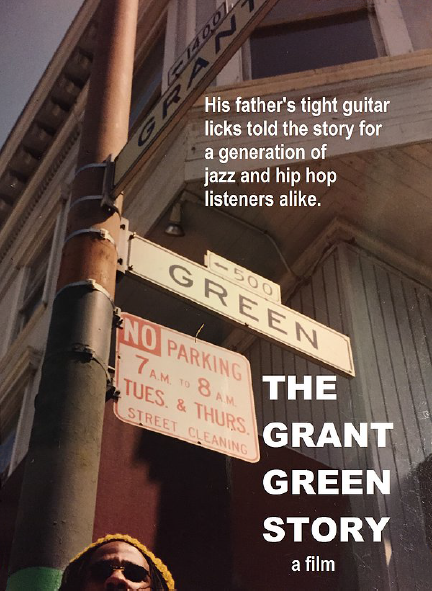 Assistant Professor Sharony Green’s first feature length documentary, The Grant Green Story, will premiere at the 11th Annual Harlem International Film Festival in New York City, September 14-18, 2016. The film unveils the life of the late jazz guitarist Grant Green, her former father-in-law. Green is best known for his work with Blue Note Records, America’s first independent jazz label, during the company’s heyday, the early-to-mid 1960s. He died at the age of forty-three in 1979. Among the individuals interviewed in the film are Grammy Award-winning musician and vocalist George Benson; alto saxophonist Lou Donaldson (who is credited with discovering Grant); legendary sound engineer Rudy Van Gelder; and record producer Michael Cuscuna.
Assistant Professor Sharony Green’s first feature length documentary, The Grant Green Story, will premiere at the 11th Annual Harlem International Film Festival in New York City, September 14-18, 2016. The film unveils the life of the late jazz guitarist Grant Green, her former father-in-law. Green is best known for his work with Blue Note Records, America’s first independent jazz label, during the company’s heyday, the early-to-mid 1960s. He died at the age of forty-three in 1979. Among the individuals interviewed in the film are Grammy Award-winning musician and vocalist George Benson; alto saxophonist Lou Donaldson (who is credited with discovering Grant); legendary sound engineer Rudy Van Gelder; and record producer Michael Cuscuna.
The film was made with the assistance of Grant Green Jr., Sharony’s former husband and Grant Sr.’s namesake (not to be confused with his brother Greg who plays guitar professionally under their father’s name). Detroit-area filmmaker Charles Cirgenski assisted Sharony as a co-producer and co-director. The film presents Grant Jr.’s search for his father. He lived with his father in the 1970s when the jazz industry was struggling, as evidenced by his father’s own financial troubles during that time. However, amid the reissuing of old jazz albums since the 1990s, the elder Green’s name has reached a new generation of listeners. His music has been sampled by many artists, including Madonna, A Tribe Called Quest, Public Enemy, and Kendrick Lamar.
Grant Green, the father, is also the subject of Grant Green: Rediscovering the Forgotten Genius of Jazz Guitar, a biography Sharony wrote that was first published in 1999. Then a journalist for the Detroit Free Press, Sharony tried to tell a story that not only unveiled her growing knowledge about jazz but explored the career of a man who manifests as an unsung hero, too. As The Grant Green Story, the movie, reveals, better-known guitarists like Benson and Wes Montgomery sung Grant’s praises. But as true of many artists, his drug addiction and his failing health prevented him from realizing the promise of his talents.
Rather than merely recover Grant Sr.’s life, Sharony decided to recover her former husband’s growing recognition of his father’s legacy. Throughout the film, the younger Grant sits on the porch of the house his father once owned on Detroit’s west side and recalls the brief time he lived there. It was a musical block. Stevie Wonder’s parents lived next door. Musicians, some of them backup artists for Motown, were often reviewing music in the living room of a house that sat on a block aptly named Greenlawn. It was no accident that the guitarist purchased a house on this street. Enchanted by his last name, he drove a green Cadillac and many of his earliest recordings had the word “green” in the title or album cover.
Grant Jr.’s journey toward learning about his father takes him outside of Detroit to New York, Toronto, and St. Louis: his father’s hometown. In addition to interviewing George Benson, Lou Donaldson; Rudy Van Gelder; and Michael Cuscuna, he interviews Michigan Congressman John Conyers Jr.; and many others, including musicians, nightclub owners and friends.
The Grant Green Story will appeal to anyone interested in postwar America, jazz, hip hop, and African American life. It also dovetails with Sharony’s interest in postwar America as revealed in “Bebop to Hip Hop: Young America and Music,” a history course she teaches at UA.
The film’s acceptance into the 11th Annual Harlem International Film Festival has a special meaning for Sharony. Harlem is a neighborhood she often visited when she lived in New York from 2000-2003. As a scholar, she is interested in the impact of gentrification on communities such as this one. Attending this festival will be a way to see the many facets of this issue. Harlem also has meaning because Grant Green collapsed from a heart attack and died at Harlem Hospital in 1979. The film’s showing at HIFF, therefore, showcases his life and legacy as coming full circle.
The Grant Green Story features the music of Brooklyn musician and choreographer Lacy James, and the melodic voice of Olivia Melton, a Tuscaloosa teenager.
For more details, visit http://grantgreenabluenote.blogspot.com/.